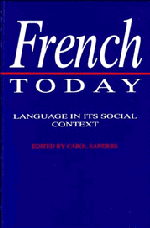Book contents
- Frontmatter
- Contents
- List of figures and maps
- List of tables
- Notes on the contributors
- Acknowledgements
- Introduction
- 1 French: a planned language?
- 2 Sociosituational variation
- 3 Regional variation in France
- 4 The other languages of France: towards a multilingual policy
- 5 The migrant languages of Paris
- 6 Gender and language in French
- 7 The reform of the writing system
- 8 Alternative French
- 9 New words for new technologies
- 10 Language and style in politics
- 11 French and French-based Creoles: the case of the French Caribbean
- 12 French in Africa
- 13 French in Canada
- 14 Sociolinguistic variation and the linguist
- Bibliography
- Index
4 - The other languages of France: towards a multilingual policy
Published online by Cambridge University Press: 05 June 2012
- Frontmatter
- Contents
- List of figures and maps
- List of tables
- Notes on the contributors
- Acknowledgements
- Introduction
- 1 French: a planned language?
- 2 Sociosituational variation
- 3 Regional variation in France
- 4 The other languages of France: towards a multilingual policy
- 5 The migrant languages of Paris
- 6 Gender and language in French
- 7 The reform of the writing system
- 8 Alternative French
- 9 New words for new technologies
- 10 Language and style in politics
- 11 French and French-based Creoles: the case of the French Caribbean
- 12 French in Africa
- 13 French in Canada
- 14 Sociolinguistic variation and the linguist
- Bibliography
- Index
Summary
The apparent linguistic unity of France hides a rather different reality of considerable linguistic diversity. Among the countries of Western Europe, France has the most varied linguistic profile. Yet it becomes quickly apparent, when one attempts to define in detail the historical stages involved in the process of the spreading of the French language, that linguistic variety in France has often not been recognised for what it is, a truly multilingual situation. Neither the linguistic conflicts resulting from this situation, nor the political implications of these conflicts, have been adequately dealt with. The ideology of French as a national language developed in conditions which repressed the regional languages which are still spoken in France. But, in spite of this desire to promote French as the one and only language of France, the goal of a monolingual situation has not been achieved. The problem of those languages often described as regional is still an issue today, as is shown by the recent publication of two studies on the question, one by Vermes and Boutet (1987) and one by Vermes (ed.1988), both in two volumes, which refer also to the presence of languages of migrant peoples. The question of the ‘other’ languages of France is not only of interest to speakers of ‘indigenous’ French languages. It is also of direct relevance to young people from immigrant backgrounds, who often find themselves in very complex linguistic and sociocultural situations, to teachers faced with cultural and linguistic diversity among their pupils, and finally to all those working in the social services, who regularly have to cope with situations involving linguistic diversity.
- Type
- Chapter
- Information
- French TodayLanguage in its Social Context, pp. 85 - 104Publisher: Cambridge University PressPrint publication year: 1993
- 2
- Cited by



